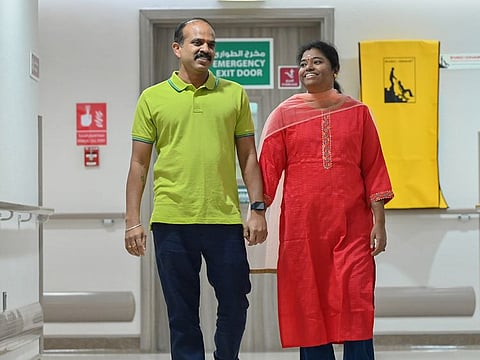UAE: Husband donates kidney to wife despite having different blood group
Successful surgery at Burjeel Medical City in Abu Dhabi challenged transplantation norms

Abu Dhabi: When 32-year-old Revathi Karthikeyan, a UAE resident, learned that she had to undergo a kidney transplant to save her life, she didn’t imagine that the journey to find a donor would be a complicated one.
Her husband, Karthikeyan, played a crucial role in his wife’s journey to healing by donating his kidney to save her life - despite them having different blood groups, which is normally a must in such cases.
A team of transplant nephrologists at Burjeel Medical City in Abu Dhabi successfully completed the complex ABO incompatible kidney transplant. This procedure, wherein the blood types of the donor and recipient do not align, challenges conventional norms in organ transplantation, where compatibility is typically a prerequisite to prevent rejection.
Unexpected diagnosis
Revathi has been dealing with IGA nephropathy renal disease since 2018, which eventually advanced to end-stage renal disease in 2023. Faced with a critical juncture that necessitated a kidney transplant, she encountered an additional challenge when she experienced a cardiac arrest. Fortunately, she was promptly revived, and hemodialysis was initiated in 2022.
The couple explored the option of a deceased donor transplant. Hope dimmed when no suitable donor was found.
“Unfortunately, no suitable donor was found in our native place. Following a family discussion, my father volunteered for kidney donation. The transplant center initiated the pre-transplant workup. Regrettably, my father was disqualified due to minor cardiac issues and a high level of HbA1c,” said Revathi.
Undeterred, Revathi’s husband stepped forward for donation. However, preliminary tests revealed a difference in blood group between Karthikeyan and Revathi.
Turning point
The turning point came when the family’s nephrologist approached Dr Ishthiaque Ahamed, Specialist Nephrologist and Transplant Physician at Burjeel Medical City. Karthikeyan was identified as a cross blood group donor. He successfully passed all blood tests, imaging, and multidisciplinary fitness assessments and cross-match evaluations confirmed that he was a suitable match for his wife.
“I was very happy when we came to know that I was able to donate the kidney. Despite approaching various transplant centres for an across-blood-group kidney transplant, we were unable to find a suitable match,” said Karthikeyan.
The decision to proceed with the pre-transplant workup at Burjeel Medical City was made after extensive discussions with Dr Ahamed. The doctor emphasised the complexity of the case, highlighting the evolution of strategies over the past 25 years that have made ABO incompatible transplants safe, with graft survival rates comparable to compatible transplants.
“When I learned about the possibility of a kidney transplant, I was both anxious and hopeful. It was a rollercoaster of emotions,” said Revathi.
In an ABO incompatible kidney transplant, the patient undergoes medical treatment before and after the kidney transplant to decrease antibody levels in the blood, thereby mitigating the risk of antibodies rejecting the donor kidney.
“In Revathi’s case, the titers are on the lower side, favouring a positive outcome. Additionally, plasmapheresis was performed to eliminate pre-existing antibodies, and the formation of new antibodies was suppressed through special injections before the transplant. Given the urgency, we decided to go ahead with the incompatible kidney transplant after explaining the pros and cons to the family. Since the patient was also very keen to go ahead with the transplant, we went ahead,” Dr Ahamed said.
Robotic surgery
Dr Rehan Saif, Director Transplant Surgery for Burjeel Abdominal Multi-Organ Transplant Program, Clinical Lead HPB Surgery, Consultant General Surgery, explained that in the context of ABO incompatible transplants, assessing antibody titers is crucial.
“Higher antibody titers pose an increased risk of rejection. The live donor nephrectomy was performed using a fully robotic procedure, offering substantial advantages over both the traditional open and laparoscopic methods. This approach ensures a faster operation, minimal blood loss, and a quicker recovery period. Both the donor surgery and recipient surgery went on for four hours,” he said.
Along with Dr Ahamed and Dr Saif, the multidisciplinary team included Dr Venkat Sainaresh Vellanki, Director - Transplant Nephrologist, Dr Ramamurthy Ganesan Baskaran, Consultant Anaesthesiology and Transplant Anaesthesia, and the ICU team lead by Dr Nicholas Wyon, Consultant Anesthesia/Critical Care Medicine, with the support of the nursing team, OT team, transplant manager, and transplant coordinator.
“In an ABO incompatible renal transplant, immunosuppression during the intraoperative period was meticulously tailored to address the specific circumstances. Complicating matters, Revathi faced challenges related to difficult central venous access, posing a considerable challenge during the surgery. Efforts were made to optimize her blood pressure to ensure the transplanted kidney began functioning effectively before she exited the operating room,” said Dr Baskaran.
Both Revathi and Karthikeyan have undergone post-surgery rehabilitation and were under close monitoring by the dedicated medical team at Burjeel Medical City.
“This groundbreaking procedure not only signifies a remarkable achievement in the realm of medicine but also brings renewed hope to a family navigating the challenges of chronic kidney disease,” said Dr Ahamed.
Gratitude
The family expressed gratitude to the team at Burjeel Medical City for their care.
“I have navigated through one of the most challenging periods of our lives. I cannot thank my husband enough for his relentless support and love. I am also deeply grateful to my children and family for providing me with courage and standing firmly by my side,” said Revathi.
According to the doctors, the patient will undergo regular follow-ups, initially scheduled twice a week, and this frequency will be adjusted to monthly visits after six months. Ongoing monitoring includes dietary adjustments, lifestyle modifications, and routine lab tests.
Sign up for the Daily Briefing
Get the latest news and updates straight to your inbox



